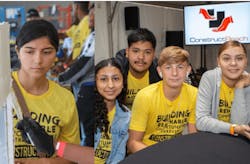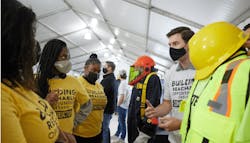How Should Construction Hiring Managers Connect With the Next Generation?
Several years ago, the construction industry was faced with a looming concern: the overwhelming number of workers set to retire over the next decade. A study conducted in 2019 determined that 41% of the construction workforce at the time was expected to retire by 2031. This concern has shifted from a future thought to today’s reality, as a large portion of retirement-aged workers have begun to leave their jobs. Simultaneously, the industry is expected to continue to grow in 2022 and beyond, especially following the passing of the Infrastructure Investment and Jobs Act. Many new construction jobs are predicted to come from this new legislation as the country updates roads, bridges, and other vital infrastructure, leaving construction stakeholders scrambling to figure out how to fill the positions that this growing industry demands.
Recruiting a New Generation of Construction Workers
Targeting the younger generations, especially Millennials and Generation Z, for recruitment is a potential solution. However, recruiting this younger population is not so simple. Millennials and Generation Z are the most ethnically diverse generations in U.S. history and have grown up in the age of the internet and connectivity. They do not communicate in the same way that Generation X and Baby Boomers (those most often in hiring positions at large general contracting firms) do. Methods that have worked for potential employee pipelines in the past are less effective at engaging young people and showing them the merits of a career in construction.
So how can your company adapt? Unfortunately, there is no cookie-cutter, plug-and-play strategy that will automatically churn out new recruits for you. It takes time, investment, and internal changes. Consider the following to effectively recruit a younger, more diverse audience:
1) Is your culture conducive to minority success?
With minorities making up most of the potential labor pool, it is crucial that construction companies invest in building a culture that can help them flourish. This goes beyond hiring a more diverse population to fill job openings. You need to create a framework within your culture that is healthy and ready to welcome diverse talent. By performing internal company assessments, conducting team training, and ensuring continuity of values from the top down, you can help foster a space that appeals to this younger demographic. Creating an inclusive culture demands involvement and commitment at every level of your company. Another strategy to help prepare your company for a more diverse workforce is investing in field leaders who are trained and have the people skills to manage people of different demographics. If your company is not set up to help minorities thrive, recruiting and retaining younger employees will be difficult.
2) Have you built relationships with educational institutions?
Many secondary and post-secondary schools, such as Career and Technical Education (CTE) schools, offer construction programs with a strong potential pool of workers. As a team, you should be thinking through what your construction company’s presence at these institutions should involve and how to develop a relationship with the institutions’ leaders. Establishing a relationship with the dean of the program for example could develop a key pipeline for you. Having a presence in schools does not require only in-person engagements; a hybrid approach including in-person workshops and virtual speaking engagements could be a very effective strategy.
RELATED
- Paul and Ebony Robinson on the Role of ConstructReach in Workforce Development
- Video: Diversity, Workforce Development, and Repairing the Community Through Construction
- After Recruiting and Hiring, Put in the Work to Keep Employees
- Quality Job Training and Taking on the Labor Shortage
3) How do you provide value with community involvement?
Presence in the community is good; but providing value in your interactions will help progress relationships and build up your pipeline. At schools, is there an opportunity for you to help update their curriculum in construction-related subjects so that students are learning applicable skills? Or maybe you can volunteer to lead a workshop during the school day to harness the curiosity of young minds. You should also seek out community organizations that are involved with young people, especially if they are engaged with young Hispanic, black, and female populations. Offer to speak on career opportunities or provide hands-on experiences with these organizations. Since Millennials and Generation Z are more diverse than past generations, finding ways to meet these groups where they are and provide value to them can help you build relationships with potential candidates for future hiring.
4) How can you engage the community through construction projects?
The most visible part of every construction company is worksites. Worksites provide ample opportunity to interact with people in a physical setting that showcases potential career opportunities. Consider hosting site visits, virtual walkthroughs, and work-based learning opportunities; giving young people hands-on applications of skills can open their mind to the real potential that a career in construction could have. Think about how you can create exposure for your company while educating potential workers at your project sites.
5) Do you have formal internship, mentorship, and new hire programs?
You simply cannot fix a problem if you do not understand what caused it. For that reason, you should have metrics set up to test the effectiveness of your internship, mentorship, and new hire programs. This will allow you to evaluate the structures in place, the reach of your programs, and your standard operating procedures. If the goal is to attract and retain young talent, then how you introduce the construction industry to them is important. An easy way to analyze your practices is setting up a process for feedback. This will help you align leadership strategies with employee opinions. It also shows that you value the voice of everyone on your team, which is important to younger hires who want to know that they are not just a cog in the machine, but a valued member of the team.
Final Thoughts
Preparing to fill the impending gap in the construction workforce must begin now, as it is already starting to affect many organizations. There is a huge opportunity to hire from the younger generations, but a focus on understanding this unique group and how to best communicate with them is imperative to effectively recruiting them. Additionally, it will take time to implement the significant changes to your company culture and processes needed to attract this demographic. The key is to be forward-thinking in your strategy; and lead in vulnerability, as the actions you take today are the building blocks for the future of your construction company. By embracing these talented individuals with a welcoming and nurturing environment designed to help them grow professionally – not simply filling empty positions in your workforce – you will see your company thrive in 2022 and beyond.


